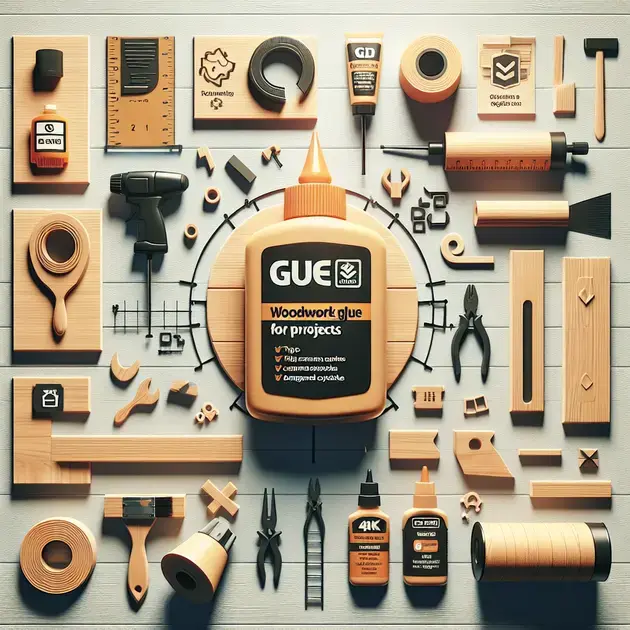When it comes to woodworking projects, selecting the right glue is essential for ensuring strong and durable bonds. In this comprehensive guide, we will walk you through everything you need to know about choosing the best woodworking glue for your projects.
From understanding the different types of wood glues available in the market to factors to consider when making your selection, this ultimate guide will equip you with the knowledge to make informed decisions and achieve professional results in your woodworking endeavors.

Factors to Consider When Choosing Woodworking Glue
When selecting woodworking glue for your projects, there are several factors to consider to ensure the best results. One important factor is the type of wood you are working with. Different wood types may require specific types of glue for optimal adhesion. Additionally, consider the project’s intended use – whether it will be indoors or outdoors, exposed to moisture, or subjected to high temperatures.
Another key factor is the open time of the glue, which refers to how long the glue remains workable after application. Some projects may require a longer open time for complex assemblies, while others may need quick-drying glue for rapid completion. Additionally, consider the strength and bonding properties of the glue to ensure it can withstand the intended workload.
It’s also essential to consider any potential health and safety concerns when choosing woodworking glue. Some adhesives may emit fumes or require special ventilation, so always read the manufacturer’s instructions and safety guidelines before use. Lastly, consider the storage and shelf life of the glue to prevent unnecessary waste.
One helpful resource for comparing different types of woodworking glue and their features is the website Woodworkers Journal. They provide in-depth reviews and comparisons of various glues, helping you make an informed decision based on your project’s specific requirements.
By carefully considering these factors, you can choose the right woodworking glue for your projects, ensuring durable and long-lasting results.
Types of Wood Glues and Their Uses
There are several types of wood glues available, each with unique characteristics and suitable applications. One common type is PVA (polyvinyl acetate) glue, which is versatile and suitable for a wide range of woodworking projects. PVA glue is ideal for indoor projects and provides a strong bond on porous materials.
Another popular wood glue is polyurethane glue, known for its exceptional strength and durability. Polyurethane glue is moisture-resistant, making it suitable for outdoor projects or applications exposed to water. This type of glue expands as it cures, filling gaps and creating a strong bond.
Epoxy glue is another type often used in woodworking for its high strength and versatility. Epoxy glue dries clear and is highly resistant to heat, making it suitable for projects that require a strong and durable bond. It is also ideal for bonding different materials, such as wood to metal.
For specialty woodworking projects, such as veneering or laminating, specialty glues like hide glue or cyanoacrylate (CA) glue may be preferred. Hide glue provides a reversible bond, allowing for disassembly and repairs, while CA glue offers rapid bonding for quick fixes or delicate applications.
To learn more about the different types of wood glues and their specific uses, Woodworking Talk is an excellent online forum where experienced woodworkers discuss and share their recommendations for various glue types based on their personal experiences.
Expert Tips for Selecting the Best Woodworking Glue
When it comes to choosing the best woodworking glue for your projects, there are several expert tips to keep in mind. Firstly, always consider the specific requirements of your project, such as wood type, project complexity, and environmental conditions. This will help you narrow down the options and select the most suitable glue.
Seeking recommendations from experienced woodworkers or professionals in the field can also provide valuable insights into the best glue for your specific needs. Online woodworking communities like The Wood Whisperer offer forums and discussions where you can ask for advice and recommendations from seasoned experts.
Before making a final decision, it’s essential to conduct thorough research on different glue brands and products to compare their features, strengths, and weaknesses. Reading reviews and ratings on reputable websites like Fine Woodworking can help you make an informed choice based on real user experiences.
Additionally, consider conducting test samples or trials with different glues to assess their bonding strength, drying time, and overall performance before committing to a larger project. This hands-on approach can help you determine the best woodworking glue that meets your specific requirements and expectations.
Lastly, always follow the manufacturer’s instructions and safety guidelines when using woodworking glue to ensure proper application and long-lasting results. By following these expert tips, you can confidently select the best woodworking glue for your projects and achieve professional-quality craftsmanship.

High-Quality Wood Glue Brands to Consider
When it comes to woodworking projects, having the right wood glue can make all the difference in the final result. Investing in high-quality wood glue brands is essential for ensuring strong and durable bonds between wood pieces. Here are some top wood glue brands to consider for your next project:
1. Titebond
Titebond is a well-known and trusted brand in the woodworking community. Their range of wood glues, including Titebond Original, Titebond II, and Titebond III, offers reliable adhesion for various woodworking applications. With a strong bond strength and quick drying time, Titebond wood glues are a popular choice among both professional woodworkers and hobbyists.
2. Gorilla
Gorilla wood glue is another high-quality option for woodworking projects. Known for its superior strength and versatility, Gorilla wood glue can bond a wide range of wood types and surfaces. Whether you are working on indoor or outdoor projects, Gorilla wood glue is a reliable choice for ensuring long-lasting bonds.
3. Elmer’s
Elmer’s is a well-established brand in the adhesive industry, and their wood glues are no exception. Elmer’s wood glue offers excellent bonding performance and ease of use, making it suitable for both beginners and experienced woodworkers. With a variety of formulas available, such as Elmer’s Carpenter’s Wood Glue and Elmer’s ProBond, you can choose the right product for your specific woodworking needs.
Overall, investing in high-quality wood glue brands like Titebond, Gorilla, and Elmer’s can ensure the success of your woodworking projects by providing strong and reliable bonds between wood pieces.
Common Mistakes to Avoid When Choosing Wood Glue
Choosing the right wood glue is crucial for the success of any woodworking project. However, there are common mistakes that many people make when selecting wood glue. By avoiding these mistakes, you can ensure that your projects are strong and durable. Here are some common mistakes to avoid:
1. Not Considering the Type of Wood
One common mistake when choosing wood glue is not considering the type of wood being used in the project. Different wood species and finishes require specific types of wood glue for optimal adhesion. Make sure to select a wood glue that is suitable for the type of wood you are working with to ensure a strong bond.
2. Ignoring the Clamping Time
Another mistake is ignoring the clamping time recommended by the wood glue manufacturer. Proper clamping is essential for allowing the glue to cure and create a strong bond between the wood pieces. Failing to follow the recommended clamping time can result in weak joints and project failure.
3. Using Expired or Old Glue
Using expired or old wood glue is a common mistake that can compromise the integrity of your woodworking projects. Over time, wood glue can lose its effectiveness and bonding strength. Always check the expiration date of the wood glue before use and opt for fresh glue for the best results.
By avoiding these common mistakes and choosing the right wood glue for your projects, you can ensure that your woodworking creations are strong, durable, and long-lasting.
Budget-Friendly Wood Glue Options for Beginners
For beginners in woodworking, finding budget-friendly wood glue options is essential for starting on projects without breaking the bank. While high-quality wood glue brands are important for professional results, there are affordable alternatives that provide decent adhesion for novice woodworkers. Here are some budget-friendly wood glue options to consider:
1. PVA Glue
PVA (polyvinyl acetate) glue, also known as white glue, is a cost-effective option for beginners. PVA glue dries clear, making it ideal for projects where appearance is important. While PVA glue may not have the same bond strength as professional wood glues, it is suitable for small crafts and beginner woodworking projects.
2. Hide Glue
Hide glue is another budget-friendly option that has been used in woodworking for centuries. Made from animal hide or bones, hide glue offers good bond strength and is easy to repair if needed. While hide glue may require additional preparation compared to modern wood glues, it is a reliable choice for beginners on a budget.
3. Cyanoacrylate (CA) Glue
CA glue, commonly known as super glue, is a quick and affordable option for bonding small wood pieces or repairs. While not specifically designed for woodworking, CA glue can provide instant adhesion for lightweight projects. Keep in mind that CA glue may not be suitable for all woodworking applications due to its fast curing time.
By exploring budget-friendly wood glue options like PVA glue, hide glue, and CA glue, beginners can kickstart their woodworking journey without overspending on materials. These affordable alternatives offer decent bonding performance for learning woodworking techniques and practicing new skills.
Conclusion
Choosing the right wood glue is paramount for the success of woodworking projects. High-quality wood glue brands like Titebond, Gorilla, and Elmer’s offer reliable adhesion, strong bond strength, and quick drying times, catering to both professionals and hobbyists. By investing in reputable wood glue brands, such as these, woodworkers can ensure durable and sturdy bonds between wood pieces, enhancing the quality of their creations.
When selecting wood glue, it’s crucial to avoid common mistakes that can compromise project integrity. Considering the type of wood being used, adhering to recommended clamping times, and using fresh glue instead of expired ones are essential practices to ensure strong and lasting bonds. By steering clear of these errors and choosing the appropriate wood glue, woodworkers can safeguard the longevity and durability of their woodworking projects.
For beginners looking for budget-friendly options, PVA glue, hide glue, and Cyanoacrylate (CA) glue offer cost-effective alternatives without sacrificing adhesion quality. While these options may have varying bond strengths and application methods, they provide suitable bonding performance for small crafts and beginner woodworking projects. By exploring these affordable wood glue options, novice woodworkers can kickstart their woodworking journey without overspending, enabling them to practice and refine their skills effectively.